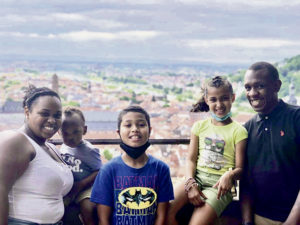
Emergencies often happen without notice. An Airman’s training proved to make a substantial difference in how a crisis unfolded for one family.
Tech. Sgt. Robert Gonzales, United States Transportation Command Patient Movement Requirements Center-East noncommissioned officer in charge, relied on first-aid training to assist Jamar Butler Jr., known as Deuce, a toddler who was choking and in need of medical attention in the Ramstein Air Base housing community, April 20.
Twyla Butler, Deuce’s mother, was distraught and searching for Gonzales at his doorstep while he was upstairs.
“She called out to me, but it was not in complete sentences,” Gonzales said. “All I could make out was ‘help,’ ‘the baby’ and ‘unresponsive’.”
Gonzales rushed across the street and entered through a partially open door and evaluated the situation.
“I walked in and Twyla said ‘Bob, it’s Deuce, I don’t know what’s wrong,’” said Gonzales. “I found him slumped back in his walker. I could not determine immediately if he was unresponsive and not breathing.”
After questioning Twyla to ensure there wasn’t any risk of head or spine injury, Gonzales pulled Deuce out of his walker and began CPR. He said it was initially difficult to help Deuce become responsive. However, Gonzales knew he could delegate certain tasks to the people gathering nearby based on prior training.

“I remember stopping and assessing the situation and noticed a crowd forming around the neighborhood,” Gonzales said.
Between compressions, he asked a neighbor to call emergency services and direct responders to their location. Time seemed to slow down during those moments.
“After what felt like an hour, the amazing medical and fire teams showed up and were able to take over,” Gonzales said.
Deuce’s father, U.S. Army Sgt. Jamar Butler Sr., 598th Transportation Brigade transportation movement coordinator, was grateful for his neighbor’s quick response. He shares similar views with Gonzales on how to stay collected during a crisis.
“You can never truly prepare for an emergency like this, but breathe and take the necessary steps,” Jamar said. “Having good neighbors that help is a definite plus.”
The following day, doctors assured Gonzales he acted appropriately. The information was encouraging to Gonzales and he was thankful for Deuce’s recovery.
“The next day, his mom basically fell into my arms and thanked me for everything,” Gonzales said. “I had to hold back tears because of the moment and the excitement in knowing Deuce was okay.”
Gonzales attributes his quick response during this unfortunate ordeal to Air Force training. He encourages others who may find themselves in a similar situation to prepare by taking advantage of the many resources available.
“Computer based training, Self-Aid Buddy Care, and once-a-month training — all of that stuff works,” Gonzales said. “You just never know when a scenario may happen where you have to fall back on those training days and use what was taught. Pay attention and try to retain everything you can.”


